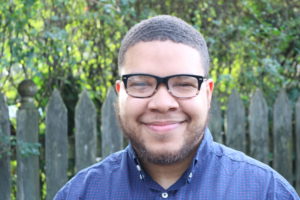The muted voice of millions

De’Quan Isom
Not a day goes by when I am not reminded of the great crisis facing many of our communities. Be it the extremes of poverty, a lack of access to resources from good textbooks to loans with non-predatory interest rates – a sense of hopelessness in cities void of healthy food options, and a safe environment to raise children.
For millions among us, the desire to pull up one’s boots and march onward like a “good” American doesn’t quite match the reality that “We have no boots to pull on.” Even the desire to reach out for help to local governments and non-profit agencies is met with its own set of roadblocks, wherein the voices of millions can go on for decades without ever being heard, even at the ballot box, due to an extensive and intentional campaign to mute them.
Growing up in Winston-Salem, North Carolina, I watched daily as my mother worked at Forsyth Medical Center to provide the best care possible to those entrusted to her care as a CNA. She worked most nights of the week, meaning that my siblings and I were left to my grandparents into the late hours of each night. She would pick us up from their home and take us to ours, a temporary abode in one of the apartment complexes throughout the city.
Her dream was not just to provide a better life for her children, but to give us an example to live up to and one day surpass. She taught us to never give up on our dreams, even when we could not see how they’d be made reality; to hold onto our faith amid chaos, and to work hard – passionately – at everything that we do. When she fell, and we experienced a few years of homelessness, we watched as she acted with grace under pressure and somehow made ways when there were none.
Her story is an American story, and one that is told too often when hardworking people are relegated into second-class citizenship even as the nation experiences record economic growth. I came to the realization over the course of my life that not all people have access to this growth, and not for a lack of trying.
My arrival at Shaw University as a freshman in 2016 was one that revealed to me that the struggle my family faced was not a micro-level event, but something felt by all types of people in every corner of this nation. It could not be made any clearer than my witness at Shaw from my freshman year up to the present, attending an HBCU located at the heart of an historically African-American community in downtown Raleigh.
By the very nature of Shaw’s urban existence, the journey from one side of campus to another forces you to leave off of campus, into the neighborhood and onto another section of Shaw’s campus. In the fall of 2016, that journey was different from the one I see today, where I encountered a community that reflected the institution it supported.
Since that time, properties which had suffered the strain of time and a lack of resources, were purchased at near dirt-low prices, renovated and sold at prices far in excess to anything affordable by the community’s historic inhabitants. This created an ironic atmosphere to be learning in – where my professors spoke of Gentrification in Urban Politics as theory, but the reality of that phenomenon was occurring before my eyes.
Even as I wondered what would happen to the impoverished forced out of their homes, not just by the market which made owning their homes next to impossible, but by the policies of the state and local governments, there was a battle going on over redistricting in the NC General Assembly and the courts.
Historically, the parallels between redistricting practices and city zoning have not been in exclusion of each other, but worked in tandem as a combined force to attack and disenfranchise the poor – especially the descendants of slaves. If this was a practice well documented in the public record, and the research of social scientists to have occurred in the early 20th century, I think it not strange to see the same occurring today.
The practice of gentrification is as sinister yet “American as apple pie” as Bishop William Barber famously decrees. When we displace hardworking Americans, and remove their right to vote, we have reinforced a caste system that relegates the poor into poverty for generations – and the advantaged into a life of privilege.
Gentrification, to me, is not just an issue of economics or social malpractice, but one which calls to the forefront a great debate in America which has yet to occur. A debate over whether we truly have a heart for the poor, rejected, and marginalized in the hopes of giving them access to our American Dream? Or have we given ourselves willingly over to our worst instincts? Are we to see in this era, a return to red-lining reinforced by not just partisan or racist gerrymanders, but economic/class gerrymanders?
The cries of millions must be heard.
De’Quan Isom is a student at Shaw University in Raleigh and a Democracy Fellow with Common Cause NC.
